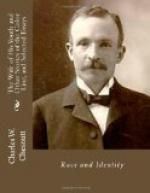During his residence in the city he had met several times his first acquaintance, Mr. Peterson, the hackman, who from time to time inquired how he was getting along. On one of these occasions Wellington mentioned his willingness to accept employment. As good luck would have it, Mr. Peterson knew of a vacant situation. He had formerly been coachman for a wealthy gentleman residing on Oakwood Avenue, but had resigned the situation to go into business for himself. His place had been filled by an Irishman, who had just been discharged for drunkenness, and the gentleman that very day had sent word to Mr. Peterson, asking him if he could recommend a competent and trustworthy coachman.
“Does you know anything erbout hosses?” asked Mr. Peterson.
“Yas, indeed, I does,” said Wellington. “I wuz raise’ ‘mongs’ hosses.”
“I tol’ my ole boss I ‘d look out fer a man, an’ ef you reckon you kin fill de ’quirements er de situation, I ‘ll take yo’ roun’ dere ter-morrer mornin’. You wants ter put on yo’ bes’ clothes an’ slick up, fer dey ’re partic’lar people. Ef you git de place I ‘ll expec’ you ter pay me fer de time I lose in ‘tendin’ ter yo’ business, fer time is money in dis country, an’ folks don’t do much fer nuthin’.”
Next morning Wellington blacked his shoes carefully, put on a clean collar, and with the aid of Mrs. Johnson tied his cravat in a jaunty bow which gave him quite a sprightly air and a much younger look than his years warranted. Mr. Peterson called for him at eight o’clock. After traversing several cross streets they turned into Oakwood Avenue and walked along the finest part of it for about half a mile. The handsome houses of this famous avenue, the stately trees, the wide-spreading lawns, dotted with flower beds, fountains and statuary, made up a picture so far surpassing anything in Wellington’s experience as to fill him with an almost oppressive sense of its beauty.
“Hit looks lack hebben,” he said softly.
“It ’s a pootty fine street,” rejoined his companion, with a judicial air, “but I don’t like dem big lawns. It ’s too much trouble ter keep de grass down. One er dem lawns is big enough to pasture a couple er cows.”
They went down a street running at right angles to the avenue, and turned into the rear of the corner lot. A large building of pressed brick, trimmed with stone, loomed up before them.
“Do de gemman lib in dis house?” asked Wellington, gazing with awe at the front of the building.
“No, dat ’s de barn,” said Mr. Peterson with good-natured contempt; and leading the way past a clump of shrubbery to the dwelling-house, he went up the back steps and rang the door-bell.
The ring was answered by a buxom Irishwoman, of a natural freshness of complexion deepened to a fiery red by the heat of a kitchen range. Wellington thought he had seen her before, but his mind had received so many new impressions lately that it was a minute or two before he recognized in her the lady whose lap he had involuntarily occupied for a moment on his first day in Groveland.




